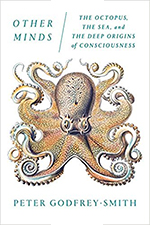 The Octopus, the Sea, and the Deep Origins of Consciousness is the subtitle of this fascinating, extremely approachable book. Paraphrasing Thomas Nagle, it asks “What is it like to be an octopus?” The author is a philosopher by training, but he does a fantastic job as a science writer, too. Anecdotes about encounters with cephalopods while diving are mixed with careful, deliberate, dejargonized descriptions of the scientific studies that have illuminated the evolution of minds. While we know that dolphins and chimpanzees and parrots are smart, they are all united in being vertebrates with a similarly-organized nervous system. Cuttlefish, squid, and octopuses are however much more distantly related (we share a common ancestor something like 550-600 million years ago), and yet they have independently evolved a remarkable intelligence. Like us, they have large nervous system and camera-like eyes, and they play, solve puzzles, and are able to recognize specific individuals (both among octopuses and humans). Unlike us, they have almost no skeletal material, most of their neurons are in their tentacles (essentially, “eight large, flexible lips”), and what amounts to a brain is roughly donut-shaped and has their digestive system pass straight through its middle! They are weird – as alien a natural being as we are likely to ever encounter.
The Octopus, the Sea, and the Deep Origins of Consciousness is the subtitle of this fascinating, extremely approachable book. Paraphrasing Thomas Nagle, it asks “What is it like to be an octopus?” The author is a philosopher by training, but he does a fantastic job as a science writer, too. Anecdotes about encounters with cephalopods while diving are mixed with careful, deliberate, dejargonized descriptions of the scientific studies that have illuminated the evolution of minds. While we know that dolphins and chimpanzees and parrots are smart, they are all united in being vertebrates with a similarly-organized nervous system. Cuttlefish, squid, and octopuses are however much more distantly related (we share a common ancestor something like 550-600 million years ago), and yet they have independently evolved a remarkable intelligence. Like us, they have large nervous system and camera-like eyes, and they play, solve puzzles, and are able to recognize specific individuals (both among octopuses and humans). Unlike us, they have almost no skeletal material, most of their neurons are in their tentacles (essentially, “eight large, flexible lips”), and what amounts to a brain is roughly donut-shaped and has their digestive system pass straight through its middle! They are weird – as alien a natural being as we are likely to ever encounter.
Godfrey-Smith describes the evolution of minds from the very earliest signalling behavior in bacteria, drawing from molecular genetics, developmental biology, ethology, and paleontology. He spends a delicious chapter among the Ediacara fauna en route. In plain terms, he illuminates what a nervous system is good for. He reveals that which is hiding in plain sight: that our nervous systems can partially operate independently of direction from our brains, and argues that octopus tentacles may well be said to “think” for themselves. He dives deep into the remarkable color/texture manipulation of the skin in these cephalopods, and the evolutionary pressures that led to their woefully short lifespans (most octopuses are dead by two years of age). He explores the possible beginnings of octopus culture at a site off the coast of Australia, and speculates how unusual social living might drive octopus mind evolution in new directions. All told, I found it to be a heartfelt, insightful book.
